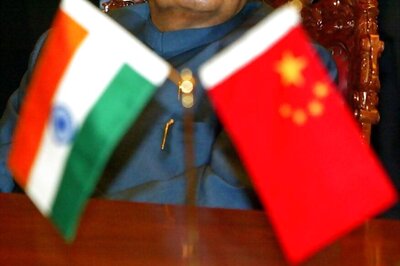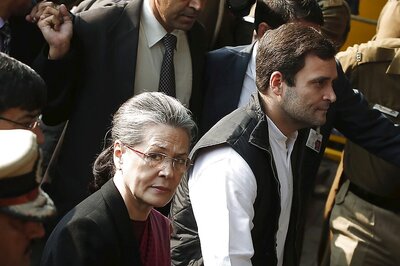
views
Israeli filmmaker Nadav Lapid’s fear of the rise of the political right in Israel, and his fear that a right-wing film industry — à la The Kashmir Files — would develop in Israel as well, led him to fight the wrong battle.
No, don’t look for this content in Lapid’s speech at the International Film Festival of India (IFFI). He said these things to the Hebrew media, when he felt safer, away from the shores of Goa. For the Indian audience, he spoke about the cinematic text of the IFFI films, and for the Israeli audience, he talked about politics.
In interviews with the Hebrew press, Lapid compared the Hindi-language drama film The Kashmir Files (TKF) to Leni Riefenstahl, a Nazi sympathiser who was commissioned to make propaganda films for Hitler. In the same interview, he also claimed that he does not need to understand the conflict in Kashmir in order to argue that TKF is a propaganda film. Since the festival in Goa came to an end, the main discussion in the media and social networks has been about the content of Lapid’s speech. But it is important to pay special attention to his unfairness. He hadn’t said harsh words in a panel where a representative of TKF also had a say. Had Lapid done so, his true knowledge about the conflict in Kashmir would have come to light. Complaints can be made to the producers of TKF about all kinds of issues – for example, the questionable objectivity of the film – but it would be hard to argue that they did not interview enough victims of the 1990s tragedy in Kashmir before they started making the film.
In a moderated conference panel, discussing some of The Kashmir Files’ merits and demerits, one may assume Lapid would have discovered a tough and opinionated opponent. Nadav Lapid, who headed the jury at the government-organised film festival in Goa did an extremely privileged and unjustifiable act. He took advantage of the TKF team’s inability to respond in real time. Let’s not forget, the TKF team had no plans to fetch any award at IFFI, they were not part of the competition at all. Lapid’s attempt was not only to discredit TKF but also to delegitimise a right-wing genre of films that lambaste the global secular and liberal order. No problem with this, as long as you are not on the podium while those voiceless people you attack have to silently swallow their humiliation.
There is also a fundamental problem with Lapid’s arguments. When he was asked how he can claim that TKF is a propaganda film, he answered that they, as a jury, were invited to judge a competition between cats and suddenly he discovered that one of the contestants is actually a rhinoceros. In this image, TKF and Leni Riefenstahl are the rhinoceros. This is an infuriating argument. A Jewish director should not so lightly compare TKF and Nazi propaganda. The Nazis blatantly lied about the Jews in their films. In contrast, even Lapid did not claim that the Kashmiri Pandit survivors lied in their testimonies to The Kashmir Files pre-production team, nor did he claim that TKF was misrepresenting the evidence it collected. This argument essentially eliminates any attempt at a reasoned debate. For any attempt to create a substantive discussion, there will always be a Chinese wall of “What to do? I see a rhino here while you see a cat.”
Lapid’s fight against TKF was unnecessary. The Kashmiri Pandits fled from or were expelled from Kashmir. Those who saw their family members being murdered and those who managed to get out of Kashmir physically unscathed, are mostly still with us. Their memory is fresh. Only three decades have passed since the exodus, and there are quite a few Indians and foreign travellers who have heard stories from Pandits in Mumbai, Delhi and other parts of India quite close to the harsh descriptions of TKF. The film may be one-sided, but it has not been proven to be unreliable. When hundreds of thousands of Indians feel gratitude towards a film that breaks the silence about their narrative on Kashmir, the last thing needed is a Western director giving them bad marks.
There is, of course, a catch here. From a theoretical point of view, it could always be argued that an artistic work is propaganda, even if there is not a single lie in it. But reality shows us that almost always, those who accuse an artistic work of propaganda, are also in an ideological dispute with that work. The case of Nadav Lapid is anything but unusual in this matter. His deep political grasp and sophistication, unrelated to his role as a film director, made him rightly identify the film’s attack on New Delhi’s Jawaharlal Nehru University (JNU) as a covert attack on the liberal cultural establishment in India and the West. An attack on him and everything he represents. As a loyal soldier of his political camp, he ambushed the shocked TKF team at IFFI.
Not every critical position towards the Pandits in Kashmir is a privileged one. Daanish Bin Nabi claimed that Pandits are privileged refugees. In a conversation I had with Professor Agha Ashraf Ali a decade and a half ago at his residence in Rajbagh, he expressed deep sorrow for the tragedy, but he also claimed that the Pandits themselves bear at least some of the responsibility for the tragedy, that there is a mismatch between the harm alleged and the remedy sought. If I understood him correctly, also in the eyes of his poet son Agha Shahid Ali, the Pandit tragedy is not and has never been the central tragedy of the Kashmir valley. The difference between Lapid’s criticism and the other criticisms that have been voiced so far is that he did not allow any discussion at all. He hid behind cinematic theories and behind the assumption that press readers in India are not exposed to his interviews in the Hebrew media.
The liberal-secular cultural figures in Israel and India are in a complex situation. Their works may be solid from an artistic perspective, but the right-wing majority powered by a mandate for change, both in India and in Israel, shows that the views of the liberal left are politically untenable and unattainable.
In such a situation, it may also be important for them to pick their battles wisely. Being embroiled in a debate about The Kashmir Files does not, in my opinion, serve the interests of those who could loosely be described as liberals in both countries. So far, it mainly provided oxygen to the camp that Lapid wanted to attack.
There is one potential damage that could occur and hasn’t been talked about yet. When Narendra Modi visited Israel, he praised two Israeli politicians in his Tel Aviv speech — Benjamin Netanyahu and the late Shimon Peres. The working assumption in India is that Israel has a bipartisan pro-India consensus, that there is no need to scrutinise Israeli guests who come to official or semi-official Indian events. Lapid created, perhaps unconsciously, a direct connection between the Opposition to Israeli right-wing policies, and the current Indian government’s policy. I hope that India will continue to see Israelis, regardless of their political affiliation, as welcome guests at cultural and academic events.
We are sure that now, after the storm he created, Lapid knows much more about the suffering of the Pandits, and that he better understands why this tragedy is regarded in India as ethnic cleansing. One day, I wish to believe that Nadav Lapid will fully apologise for the IFFI provocation.
Lev Aran is a former coordinator of the Israel-India Parliamentary Friendship League. He is an Israel-based freelance columnist and journalist. His work has been published in Makor Rishon, Mida, Ynet MargAsia among other publications. He tweets at @LevAranlookeast. Views expressed are personal.
Read all the Latest Opinions here




















Comments
0 comment